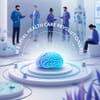The global market for AI-driven mental health applications is projected to surge from $0.92 billion in 2023 to $14.89 billion by 2033, indicating a growing interest in AI's potential to address mental health challenges. AI technologies like machine learning, natural language processing, and computer vision are being explored for early detection, diagnosis, and treatment of mental health conditions.
AI-powered chatbots, such as Woebot and Ellie, offer 24/7 therapy sessions, tracking users' moods and providing curated resources to manage mental health. These chatbots have shown promise in reducing symptoms of depression and anxiety. Additionally, AI algorithms can analyze electronic health records, neuroimaging, and genomic data to identify effective treatment strategies and predict patient outcomes.
However, concerns remain about the limitations of AI in mental health care. Limited access to high-quality, diverse mental health data hinders AI model development, and algorithmic bias can lead to inaccurate assessments. Furthermore, the use of AI in mental health raises concerns about data protection and potential misuse.
As AI continues to evolve in mental health, researchers and practitioners are working to address existing challenges and explore new applications. Immersive virtual reality experiences, like XAIA, provide mental health support using generative AI. The development of emotionally intelligent AI systems that can understand and respond to emotional nuances is also an area of ongoing research.
The integration of AI in mental health care has the potential to revolutionize the field, providing more accessible and effective support for individuals in need. As the field continues to evolve, it is essential to address the challenges and concerns associated with AI in mental health care to ensure that these innovative solutions are used responsibly and effectively.


